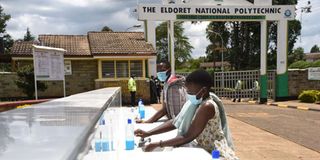WASH is key to infectious disease fight

Students at the Eldoret National Polytechnic in Uasin Gishu County wash their hands outside the institution on October 05, 2020.
What you need to know:
- But despite the benefits, water, sanitation and hygiene (WASH) is often not prioritised.
- WASH in schools is a fundamental necessity for children’s wellbeing – health and development.
Pervasive unhygienic conditions and use of unsafe water have been identified as a key underlying factor in thousands of deaths prior to and during the Covid-19 pandemic.
Although the virus is deadly, it can be contained by effective public health systems like face mask and alcohol-based sanitisers.
Recent studies cite hand hygiene is the single-most effective intervention to prevent the transmission of the coronavirus.
But despite the benefits, water, sanitation and hygiene (WASH) is often not prioritised. Kenya’s public spending on WASH lags far behind need, allocating only 0.2 % of gross domestic product (GDP) to it compared to the global target of 0.9 % and eThekwini Declaration commitment of 0.5 %. In 2010, its combined water and sanitation expenditure was 0.86 % of GDP, down from 1.10 % in 2008.
A Joint Monitoring Program (JMP) analysis for water supply and sanitation indicates that overall sanitation coverage is 31% -- 32% for rural and 27% for urban.
WASH is a challenge in many schools. The number of restrooms is insufficient for the student population. A Unicef country report estimates that only 14% of Kenyans have handwashing facilities with soap and water. At 16 million, school children make up a large proportion of the population.
Investing in WASH not only increases girls’ enrolment, implementation of children’s rights and the protection of children against the transmission of coronavirus but also other infectious diseases like flu, pneumonia, diarrhoea. Some 5,000 children under five die from diarrhea in the country every year.
Preventable illness
This preventable illness is the leading cause of mortality in this age group, and yet simply washing hands with soap can reduce diarrhoea deaths by 42-47%. Besides, the economy loses Sh27 billion, one per cent of the national GDP, annually due to poor sanitation.
WASH in schools is a fundamental necessity for children’s wellbeing – health and development. Studies show lack of sufficient WASH facilities affects schoolgirls disproportionately, especially when menstruating.
In Kenya, girls miss nearly 3.5 million learning days per month due to limited access to sanitary products and lack of adequate sanitation. In Sub-Saharan Africa, more than one in 10 girls miss up to 20% of the school year due to menstrual cycle.
Additionally, lack of access to safe water and sanitation perpetuates a cycle of poverty in girls and women. Every day, women who lack access to these resources spend 125 million hours collecting water for their families and 266 million hours finding a place to relieve themselves.
To achieve the ambitious target of universal access to clean water and sanitation in the UN Sustainable Development Goal 6, the government must adhere to the 2015 Ngor Declaration, that 0.5% of the annual national budget be allocated to sanitation and hygiene.
Previous emergencies show that to effectively stop the spread of the virus and be better prepared for future pandemics, hand hygiene must become a norm for everyone.





